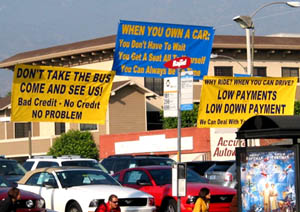 |
Organic Society
Organic Society & Capitalism - Part II
The Harmful Mentality of Borrowing Money
Plinio Corrêa de Oliveira
Another point I would like to address, related to Capitalism and Organic Society, is a wrong mentality of many persons that provides the basis for the excessive growth of banks and financial institutions and their inorganic practices. Here I refer not to an intrinsic defect of the banks themselves, but to the mentality of persons accustomed to borrowing money from them.
I had an economist friend who synthesized this modern mindset very well. He used to say: “Today people buy things they don’t need with money they don’t have.” I believe this simple statement covers a good part of the problem I want to address.
Buying things you don’t need
There are countless persons who are voluntary victims of advertisements that offer an endless list of things they don’t need:

Ads assail us with brand names and luxury goods |
• The latest vacuum cleaner that washes as well as vacuums the carpet.
• A refrigerator with a new kind of ice machine that crushes the ice instead of making cubes.
• A wrist watch with novel features showing the moon phases as well as the times in the principal capitals of the world - data one will likely never use.
• A shower that sends out multiple jets of water in different speeds allowing you to transform your bathroom into a private massage center.
• A new car with a dashboard filled with controls and buttons, making the driver feel as if he were the commander of a jet plane.
There are thousands of cheap or expensive new items and gadgets like these that you don’t really need, but that are presented by seductive ads as indispensable, if you want to be fashionable and up-to-date.
I know that my friend’s formula is a bit simplified. At times you do need to buy a new car because the old one is worn out and gives you three times the expenses of a new one. But the formula still serves to cover a general mentality that prevails today. It refers to the mania for constant change, a need to replace objects that a person already had and were still working well.
With money you don’t have
How does a person purchase such merchandise? He borrows money to buy them. That same advertising always provides easy conditions to purchase the goods: “No money down!” “Small monthly payments!” etc. Here we touch the serious defect I mentioned before: It is the mentality of the consumer who keeps borrowing money to live his normal life and, thus, is always in debt.
I am a strong opponent of this mentality of borrowing money. On the contrary, I am an enthusiastic supporter of the idea of saving money before buying anything. It is reasonable for a man who is not rich to buy only what is indispensable or necessary. When he has what is sufficient for himself and his family, or if he is wealthy, he may go beyond these parameters and also buy what is convenient or superfluous.
When one borrows money to buy something, he pays not only the principal (the amount asked for the item) but also the interest charged by the financial institution that lent him the money. When he is finally free of his debt, he has paid two or even three times the initial price of the item. He could have bought it for the initial price, or even for less, if he would have saved before buying.

Businesses entice buyers with promises of easy credit and low payments |
So for the period of the loan, that individual is working for himself only one-third of the time; the other two-thirds he is working for the bank. And for what? In order to buy something immediately that he could have bought at the original price, if he would have had the temperance, patience and discipline to save before buying it. That is, he is working more for the money lender than for himself. He has become a sort of voluntary slave of the bank, giving the bank two-thirds of his work.
Translated in another way, let us suppose that a man has about 40 years that he has worked full time at a job. If he purchased everything under this system of loans, at the end of these 40 years he would have worked more than 26 years for the bank.
It is not difficult to realize that the banks are the winners in such a system. It is no wonder they do all they can to encourage people to take out loans and stimulate the stores to sell merchandise on credit payments. Behind commerce is the bank.
What is amazing to me is that in the United States, a country that pretends to be the El Dorado of liberty, a great number of Americans are addicted to this system of loans. In fact, the reality is quite different from appearances: they are not living in liberty, but in a system of forced labor for the banks. People work most of their time just to pay the interest on their loans.
A student borrows money to pay for his university studies; then he graduates, marries and borrows money to buy his house. Both he and his wife need cars, so he borrows money for the vehicles, and this goes on and on. Let us look briefly at the time it will take him to pay off these initial debts. It may take him 5 to 10 years to pay off his school loans; the house generally takes 30 years; the cars, 3 to 5 years. Thus a typical middle-class man who graduates at around age 22 will be carrying debts on his shoulders until he is 52, almost the time to retire. In the meantime, he may need other loans for his career or business. You can see that I am not exaggerating when I say that he spends a large percentage of his time working for the bank.
Psychological, moral and social consequences
What are the consequences of this addiction?
Psychologically - A person who owes a large amount of money to someone who is not his father, mother or close relative has to feel anxiety. This makes sense, since no one knows the future. What if the person loses his job or gets sick and cannot make his payments? I believe that this uncertainty can destroy the psychological balance of many persons. I would not be surprised if this kind of stress were the cause of many heart attacks.

In the lower or higher classes the house should stay in a family for many generations as a factor of stability. Above, an English cottage, below, a family chateau in Southern France
 |
Morally - Further, many of these loans are taken to purchase things that make a person appear to have a higher social and economic level than he really has. Ambition is what drives this claim to a new status that implies larger and fancier houses, new cars, trendy trips, etc. But once he enters this cycle of ambition/expenses, it is hard to get out of it. It is understandable: The impressions produced do not last very long, and the desire to be admired only grows - thus the need for more and more expensive things.
This is morally condemnable as well as economically damaging. Such an individual shortly will be buried in debts he can never clear. At this phase, when his economic dependence on the bank is complete and his insolvency total, he can easily reach a state of near despair, making him a typical prey for Masonry. “Come with us, we will pay your debts, and you will have all possible success,” he is told. Financial slavery to the bank caused by slavery to his ambition is transformed into ideological slavery to the Secret Forces. From now on, he is the docile tool of Masonry to promote whatever revolutionary ideals it orders.
Socially - The system of loans and mortgages undermines the stability of the family. The man who borrows compromises his future. He may become physically or mentally incapable of earning his salary or administering his business. Then his debts fall to his wife and children. Thus, in the long run, instead of providing for his family, he becomes a burden to it. The father who is normally the base of the family’s stability is transformed into the opposite.
Psychologically, morally and socially, this system of borrowing money is harmful. It is the opposite of what an organic society should be.
I believe that if people would stop borrowing, the banks would lose an enormous number of free workers whom they manipulate through usury. The banks would then be much less powerful. Free of this economic slavery, individuals, their families and society would benefit much more from the labor and efforts of each one.
In an organic society, one lives according to his own social and economic level. He spends only what he can pay for, based on his previous savings. As often as possible, he receives and keeps the same land and house of his parents; he doesn’t follow the fashion of getting a bigger house he can’t afford. He doesn’t try to appear to be more than what his parents were. His ideal for him and his family is to follow Catholic morals and customs in everything in order to build a Catholic Civilization on earth, and in so doing, to prepare himself to enter Heaven when his term on earth is ended.
This is different from the modern mentality. It is part of the counter-revolutionary mentality.

Posted September 15, 2008
Continued

  | | Prof. Plinio |
Organic Society was a theme dear to the late Prof. Plinio Corrêa de Oliveira. He addressed this topic on countless occasions during his life - at times in lectures for the formation of his disciples, at times in meetings with friends who gathered to study the social aspects and history of Christendom, at times just in passing.
Atila S. Guimarães selected excerpts of these lectures and conversations from the trancripts of tapes and his own personal notes. He translated and adapted them into articles for the TIA website. In these texts fidelity to the original ideas and words is kept as much as possible.

Related Topics of Interest
 Critique of Capitalism from an Organic Perspective - Part I Critique of Capitalism from an Organic Perspective - Part I
 The Role of Economy in the Collapse of the Medieval Mentality The Role of Economy in the Collapse of the Medieval Mentality
 The Decay of the Medieval Guilds The Decay of the Medieval Guilds
 Proportion Between the City and the Man Proportion Between the City and the Man
 A Distributist Manifesto Strongly Spiced With Communism A Distributist Manifesto Strongly Spiced With Communism
 False Statements About Life in the Middle Ages False Statements About Life in the Middle Ages

|
Organic Society | Social-Political | Home | Books | CDs | Search | Contact Us

© 2002-
Tradition in Action, Inc. All Rights Reserved
|
 |
|